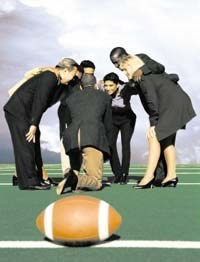
Management of any property requires a varying degree of resources and skills. Materials, capital, and personnel are required for everything from ordering supplies to the complete overseeing of a multi-unit, high rise condominium. Above all resources, human resources, are typically considered the most important asset of any business or company, and managing those living resources is an art, a science, and a very necessary skill set.
“To me, human resources are not only support for the staff, but it also has to do with benefits and financial services,” says Dan Rivers, director of the management division at G&G Management in Newton, Massachusetts. “It’s also an ear for the staff if they have any issues or if they need any support, whether it’s financial or issues going on with another person.”
“I would broadly define the term ‘human resources’ as anything related to the discipline of managing employees,” adds Michael R. Phillips, CPA, the chief operating officer of The Copley Group in Boston, “including hiring, terminating, payroll, personnel, benefits and creating a culture and work environment for the employees.”
Well-trained, motivated employees enhance the appeal and ambiance of a property, adding to both the real and perceived value. Who does the hiring, the training, and the evaluations may vary between properties, but generally speaking, the trustees, the board of directors, and the property management company will work together to achieve the best results. When an effective system is in place, and working well, the board will delegate to the manager on the staff’s performance expectations, the manager will develop and enforce the policies, and be held accountable to the board. The manager will generally act in an advisory capacity, before, during, and after new staff is brought on board, while the actual hiring of new employees is usually a board function.
“I believe that employees of a condominium building have dual employers: both the condominium association and the management company. It is critical for the board and the management company to work together in managing employees,” says Phillips.
“It is inevitable that a board or one of its members will provide some direction to the staff. An example would be simply informing the staff of something they observe in the building that needs attention. The management company should embrace this type of interaction between the board and the staff. But major matters such as communicating policies and procedures, providing feedback on job performance or discipline needs to be a joint effort between the board and the management company.”
“The role of the association board is more to set policy. Once the board has set what their expectations are and what they want, it’s the management company’s job to implement it and manage the staff,” says Rivers. “We will do a lot of legwork. For example, say they have a janitorial staff—they’ll say we want the lights changed regularly or the hallways vacuumed and we want the windows washed once a month. They’ll give us the guidance and we work with the staff to make sure they adhere to it,”
Customer Service
Ian Gopin, president of G & G Management, has created a web-based program designed to ensure consistent customer-centric service. His goal is to provide each company associate with the needed tools to deliver memorable service and value-added solutions for each client property. “It’s basically a website and each individual homeowner will have their own log-in,” says Rivers. “They can see their account, if their balance has been paid, they can put in a work order, access the minutes to a board meeting or make a general comment. It was created so it could be changed as needed to make sure that we could conform to the needs of the association. Email updates can also be sent from there and a lot of people use email these days.”
Rivers utilizes the program, My Home, in house, as well as for the properties managed by G&G. He understands that the combined effort involved with everyone working as a unit to provide a personal part of the total service and that teamwork will produce an overall better result than if each person were working toward the same goal individually.
Avoid Common Mistakes
Phillips, who has been involved with residential, commercial and retail real estate for nearly 30 years, has seen new property managers make many mistakes. For example, “Not providing direction or feedback on job performance, not communicating, not sharing goals and objectives, not supporting or respecting employees and not dealing with problem employees are just a few of the mistakes I’ve seen new property managers make,” he says. “I also see mistakes that property managers make like not understanding and helping employees balance the demands of the job with their personal lives, being too strict or not strict enough, not dealing with problem employees and showing favoritism.”
“I think the most common mistake new property managers make is that they don’t communicate properly to the owners or to the board,” says Rivers. “It’s not that they are not on top of everything because in our life, you are so busy, and you are doing so many different things. The problem is that you have to communicate it to the proper people at the proper time or you’ll have owners who are angry because they don’t know what’s going on or a board gets cornered by an owner and they don’t know what’s going on with a situation, so they can’t answer properly.”
Bob McBride, CEO of The Dartmouth Group in Bedford, Massachusetts, encourages new managers to establish and maintain trust, rapport and support with staff in order to provide the level of service expected by the client.
McBride feels that the most common mistake a new manager makes is having a lack of compassion. “New managers don’t automatically develop empathy,” says McBride. They need to understand how the resident feels. They need to put themselves in the shoes of the resident, instead of seeing them as people who have issues, and realize that our job as managers is to solve their problem. Sometimes new managers will get frustrated—they’ll think that people are picking on them. They’ll take it personally. Part of it is the nature of the manager themselves. They need to understand that if none of these associations had any issues, you wouldn’t have a job. And it’s our job as managers to solve their problem. We need to hear them out. They need to know we are here to help them.”
Education and training for managers is available from a number of sources. Phillips stresses the value of peer learning, mentoring and roundtable discussions with industry experts. “But many qualities of being a good manager are intrinsic and not learned from experience,” he says. “Examples are being organized and a being a good communicator.”
“You kind of learn to be a good manager by fire to some degree. You are going to learn how to manage a building by getting your hands dirty,” says Rivers. “So if you have a bedbug issue you actually have to do research and meet with the proper people who do bedbugs. You research online; you talk to other management staff in the office. My role as director is to work with the property manager on a day-to-day basis to make sure I can support them and if I don’t know the answer, we come up with ways to make sure we get them the proper answers.”
“You get experience usually by working with a management company either starting in a customer service role, working as an assistant or an administrator on-site,” says McBride. “You may even learn as a maintenance superintendent on site. We also bring our managers together once a month from the field into the corporate office. We’ll have sessions, maybe, an education session or best practices on how it relates to insurance, roofing—it could be a number of topics. It also gives them the opportunity to interact with other building managers and have the chance to see what they’ve done in the past to solve issues that they might currently have.”
Resources Available
For education, networking within the property management arena, and leadership training, industry experts recommend local chapters of the Community Associations Institute (CAI) and the Institute of Real Estate Management (IREM), which has a local chapter in Boston. You can also log onto New England Condominium at www.newenglandcondo.com for management education, tips and advice.
The Wellesley, Massachusetts-based CAI-New England serves the educational, business and networking needs of community associations in Massachusetts, Rhode Island, Vermont and Maine. Connecticut and New Hampshire also have their own CAI chapters. With nearly 60 chapters worldwide offering services and programs to its members, membership in CAI includes condominium, cooperative, and homeowner associations and those who provide services and products to associations. For additional information on CAI and its chapters, visit www.caionline.org.
For information about IREM Boston’s Metropolitan Chapter No. 4, contact Kelly Hannon at 617-436-7565 or visit www.iremboston.org.
Overall, managing human resources is about providing excellent service, working as a team, sharing successes, failures, and training to continually improve performance—and of course, a dose of humor never hurts. Humor and recognition for a job well done are both excellent teachers and motivators, and the best managers know that. When individuals learn to work together as a group, and/or a team, cohesiveness is often experienced as a result of mutual positive attitudes.
Experts agree that in the end, the only thing that matters is what should be done for the greater good of the property and doing whatever is necessary to get the job done.
Anne Childers is a freelance writer and a frequent contributor to New England Condominium. Staff writer Christy Smith-Sloman contributed to this article.






Leave a Comment